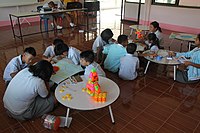
Photo from wikipedia
Abstract Project-based learning (PjBL) is understood to be a promising approach that improves student learning in higher education. Empirical studies on project-based learning have been reviewed with a focus on… Click to show full abstract
Abstract Project-based learning (PjBL) is understood to be a promising approach that improves student learning in higher education. Empirical studies on project-based learning have been reviewed with a focus on student outcomes. Affective outcomes (i.e. perceptions of the benefits of PjBL and perceptions of the experience of PjBL) were most applied, which were measured by questionnaires, interviews, observation, and self-reflection journals. Cognitive outcomes (i.e. knowledge and cognitive strategies) and behavioral outcomes (i.e. skills and engagement) were measured by questionnaires, rubrics, tests, interviews, observation, self-reflection journals, artifacts, and log data. The outcome of artifact performance was assessed by rubrics. Future research should investigate more about students’ learning processes and final products. Measurement instruments and data analyses should also be improved.
Journal Title: International Journal of Educational Research
Year Published: 2020
Link to full text (if available)
Share on Social Media: Sign Up to like & get
recommendations!